Kissinger, architect of US foreign policy in 20th century, dies at 100
Tributes have poured in for the former US secretary of state, the most polarising and influential diplomat of the 20th century.
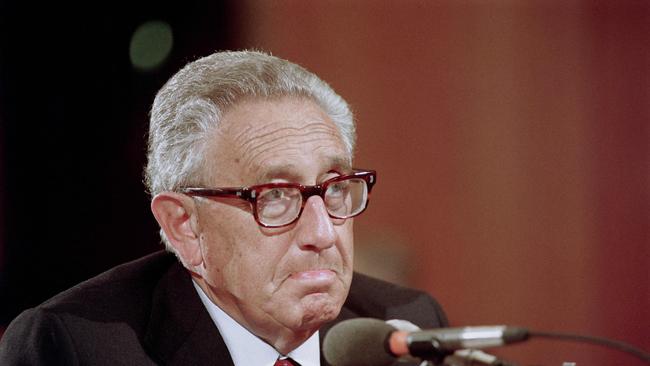
Henry Kissinger, the most influential diplomat of the 20th century, has died in Connecticut aged 100, closing an extraordinary career that helped end the Cold War, establish relations between Beijing and Washington, and green light Indonesia’s invasion of East Timor.
Dr Kissinger, a German-born Harvard University academic who rose to become national security adviser and secretary of state under Republican presidents Richard Nixon and Gerald Ford, was crucial in negotiating an end to the Vietnam War, winning the Noble Peace Prize in 1973 for his efforts along with Vietnamese leader Le Duc Tho.
A polarising figure who argued that peace between great powers should take priority over human rights and democracy, Dr Kissinger helped pave the way for Nixon to meet Chinese leader Mao Zedong in 1972, which led to the restoration of full diplomatic relations between the two superpowers of the 21st century.
Dr Kissinger, whose trademark thick German accent remained despite fleeing Germany in his teens, advised 12 presidents, Republican and Democrat, from John F Kennedy to Joe Biden, urging an isolation of the Soviet Union throughout the 1970s and 1980s and leading to a detente, which ultimately saw the communist behemoth collapse in 1991.
“America has lost one of the most dependable and distinctive voices on foreign affairs” said former president George W Bush in a statement on Wednesday (Thursday AEDT) after Dr Kissinger’s death was announced by his private consulting business.
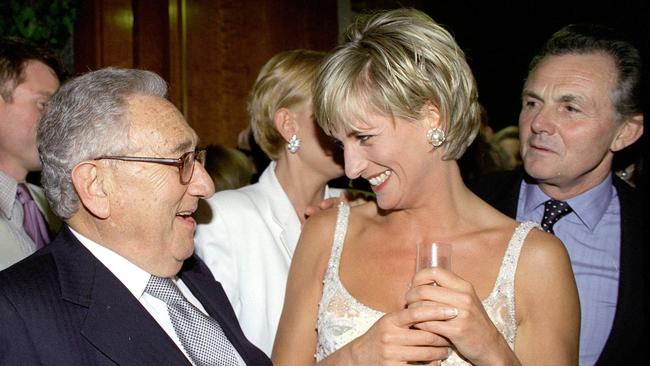
Former prime minster John Howard lauded Dr Kissinger, who was born in Bavaria to a schoolteacher and a homemaker in 1923, as a “titan” who shaped “the geostrategic environment in which Australia and her region lives”.
His predecessor Paul Keating, in a statement recounting their numerous meetings on the board of the China Development Bank, said Dr Kissinger’s death “drew to a close the epoch of intellectualism in foreign policy”. “His great strength was that he thought in original terms, eschewing the derivative thinking which so dominates patterns of thought these days”.
Fearful of the spread of Soviet power, Dr Kissinger encouraged the expansion of regimes regardless of their human rights record, agreeing to Suharto’s invasion of East Timor, pushing the US to overthrow Chile’s socialist president Salvador Allende in 1973, and backing Pakistan’s brutal suppression of the Bangladesh independence movement in 1971.
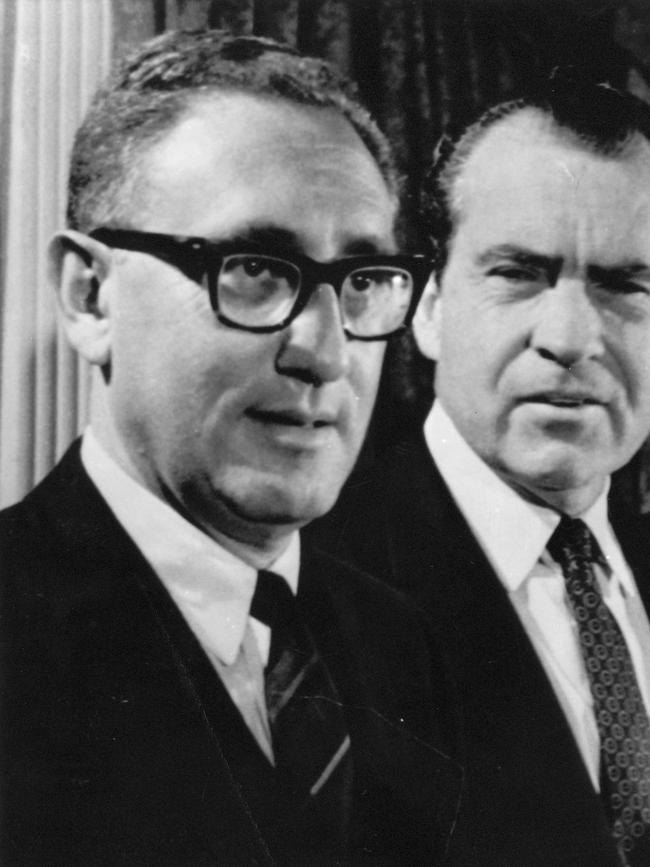
“Many alleged that Henry Kissinger could be divisive and polarising. On occasions he certainly was: then so were others who have left a positive mark on world history,” Mr Howard said.
A Jew who helped negotiate an end to the 1973 Yom Kippur War, after Egypt and Syria attacked Israel, Dr Kissinger nevertheless controversially exhibited indifference to the plight of the Jewish people when they might hinder US interests.
“It they put Jews into gas chambers in the Soviet Union, it is not an American concern. Maybe a humanitarian concern,” he told Nixon, in taped remarks that emerged in 2010, symbolic of a ruthlessness that earned him as many detractors as admires.
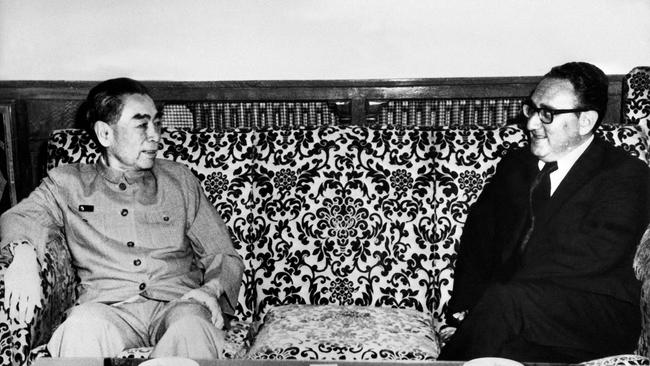
Founding the influential consulting firm Kissinger Associates in 1982, he remained a force in global foreign policy well after his departure from public office in 1976, pushing for a compromise with Vladimir Putin’s Russia after its invasion of Ukraine in 2022 for fear of a nuclear weapons conflict.
“Apart from presidents Woodrow Wilson, Franklin Roosevelt and Nixon himself, he probably had more decisive global influence as secretary of state than any president,” former NSW premier and foreign minister Bob Carr told The Australian on Thursday.
Dr Kissinger was warmly received by President Xi Jinping in Beijing in July, who remarked, “the Chinese people never forget their old friends, and Sino-US relations will always be linked with the name of Henry Kissinger”, a stark contrast to Mr Xi’s frosty treatment of Joe Biden’s officials.
“The Chinese leaders always saw him because they saw him as a highly influential individual and a reasonable interlocutor,” former ambassador to the US Arthur Sinodinos told The Australian. “He was always promoting dialogue, and he was always playing chess a few moves ahead,” he added.
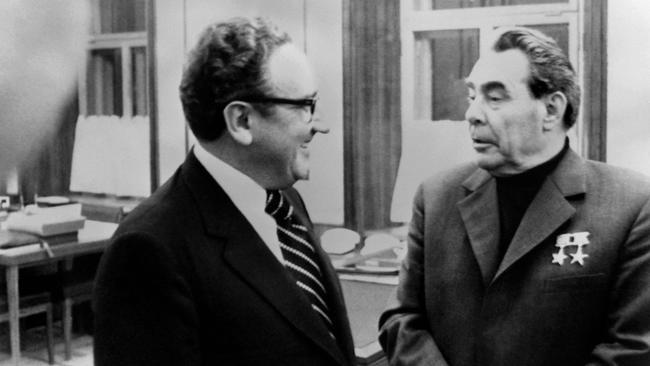
Former prime minister Tony Abbott said Dr Kissinger’s opening up of China had proved a mixed blessing. “It illustrates Palmerston’s dictum that a country’s interests are more lasting than its friendships,” he said.
Ford awarded him the Presidential Medal of Freedom in 1977, saying he “wielded great power with wisdom and compassion in the service of peace”.
Barack Obama was later less charitable, observing in The Atlantic in 2016: “We dropped more ordnance on Cambodia and Laos than on Europe in World War II” and rubbishing his role in Vietnam, which ended in humiliating defeat for the US.
Chicago University professor John Mearsheimer, one of the world’s top international relations scholars, said Dr Kissinger was “the embodiment of the American foreign policy establishment”.
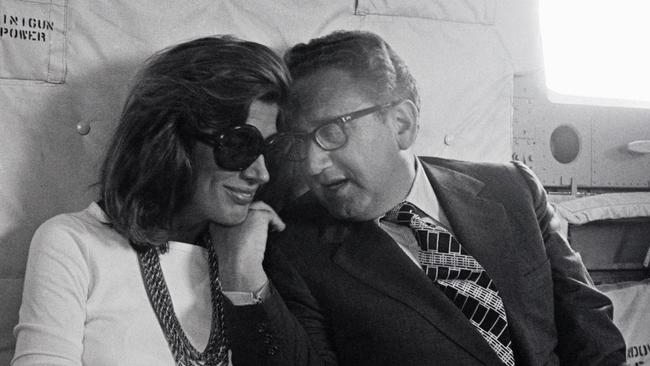
“His influence, however, extended across the entire globe; some thought he was a strategic genius, while others though he was a war criminal or a second-class strategist; regardless, nobody can deny that he cast a giant shadow,” he told The Australian.
A prolific author of at least a dozen books, Dr Kissinger became the totemic of a “realpolitik” foreign policy, which put state and political interests first regardless of immediate human ramifications.
“The illegal we do immediately, the unconstitutional takes much longer,” he once quipped.
Michael Thawley, Australia’s former ambassador to the US, said Dr Kissinger’s books were “worth reading because they were the work of a strategist”.
He recounted a humorous anecdote during one of Dr Kissinger’s trips to Australia when he was given a lift in a RAAF plane. “They always offered Fantails – he ate one and lost a crown,” he said.
Kissinger Associates said that Dr Kissinger’s family would hold a private funeral, with a memorial service to take place later in New York, where he grew up after his Jewish family fled Nazi Germany.




To join the conversation, please log in. Don't have an account? Register
Join the conversation, you are commenting as Logout